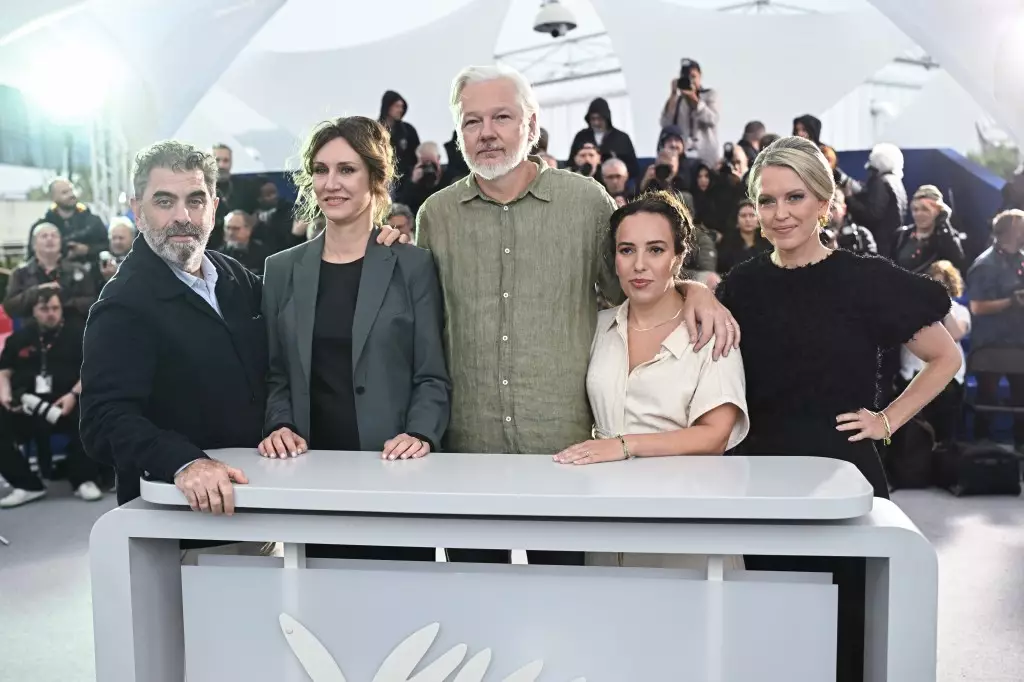The digital landscape has dramatically evolved over the years, yet the chilling silence surrounding whistleblower platforms like Wikileaks has become alarmingly loud. With no original publications emerging from this once-groundbreaking organization for over five years, the question arises: who truly benefits from this strategic silence? The depressing answer seems to suggest that while governments revel in their freshly minted environments of secrecy, the values of transparency and democratic accountability are being suffocated. Filmmaker Eugene Jarecki’s documentary, *The Six Billion Dollar Man*, seeks to shine a bright spotlight on this grim reality, documenting the relentless pursuit of Julian Assange by successive U.S. administrations.
A Price Tag on Freedom
According to Jarecki, the U.S. government’s financial commitment to dismantling Assange and his initiatives has reached a staggering $6 billion. While legal fees and investigative costs account for a mere fraction of this colossal sum, the bulk comprises foreign aid manipulated to coax Ecuador into surrendering Assange from the sanctuary of its embassy in London. This revelation dramatically underlines the lengths to which powerful nations will go to maintain control over information—and to quell dissent. It raises a disturbing question: how far can a government justify spending taxpayer dollars to eliminate a perceived threat to its narrative?
Indeed, the extent of U.S. intervention is shocking but not surprising. History is rife with examples of governments leveraging financial aid to advance their interests, often leaving a trail of ethical concerns in their wake. The very act of manipulating debt to influence a country’s sovereignty and decisions is a hallmark of imperialism dressed as humanitarianism, and it’s a dangerous road we tread when such practices go unchecked.
Descent into Authoritarianism
The case of Julian Assange serves as a cautionary tale, one that warns of the encroachment on civil liberties masked as a fight against security threats. Through his extended legal battles and subsequent imprisonment, Assange has experienced firsthand just how swiftly a democratic society can adopt authoritarian measures in the name of national security. In stark contrast to the principles of openness and accountability that underpin democracy, the decades-long campaign to discredit him suggests that those in the upper echelons of power may view transparency as a threat rather than an asset.
When governments prioritize control over dialogue, the bedrock of democracy begins to crumble, leaving citizens ill-equipped to hold their leaders accountable. The repercussions of this shift are staggering—when the whistleblowers are silenced, who remains to challenge systemic injustices, corruption, and human rights violations? Jarecki’s portrayal of Assange’s story evokes profound implications for our understanding of freedom in the 21st century. It begs us to examine what we are willing to compromise in the name of safety.
A Flicker of Hope on the Horizon
Melodrama permeates Jarecki’s documentary, not just in its shocking revelations but in its deeper commentary on the need for societal reflection. Assange’s presence at the premiere of *The Six Billion Dollar Man* in France symbolizes a striking irony: a figure once vilified has emerged as an emblem of resilience against systemic oppression. This human aspect, coupled with the film’s ultimate message, carries a semblance of hope, suggesting that the spirit of activism has not been extinguished.
As Jarecki concludes, Assange’s narrative is intricately woven into the fabric of our contemporary struggle for civil rights. The film’s rising popularity, evidenced by its Special Jury Prize at Cannes, hints at a growing awareness and demand for stories that challenge the status quo. While mainstream avenues may eschew such content for fear of backlash, the lure of a resonant, authentic narrative could compel change, reawakening a public thirst for transparency and accountability in an increasingly dystopian climate.
Paving the Way Forward
In a time when modern democracies face existential threats from surveillance, misinformation, and corporate influence, organizations like Wikileaks carry a heavy burden. As *The Six Billion Dollar Man* aptly illustrates, the battle for transparency is not merely a struggle for one individual but is emblematic of a collective fight for democratic integrity. Engaging with challenging narratives and fostering public discourse on the implications of unchecked governmental power is now more vital than ever.
In reflecting on these themes, it’s essential to remain vigilant in advocating for freedom of expression and to cherish those willing to stand up for the truth, regardless of the personal costs. The fight for transparency is a fight for democracy itself.


Leave a Reply